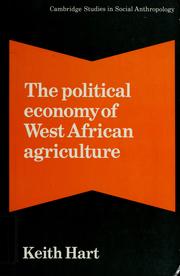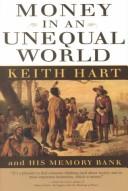| Listing 1 - 10 of 28 | << page >> |
Sort by
|

ISBN: 0521284236 0521240735 0511558015 9780521284233 9780511558016 9780521240734 Year: 1982 Volume: 43 Publisher: Cambridge: Cambridge university press,
Abstract | Keywords | Export | Availability | Bookmark
 Loading...
Loading...Choose an application
- Reference Manager
- EndNote
- RefWorks (Direct export to RefWorks)
West Africa's agriculture has, for 150 years, been heavily geared toward export, yet the region is one of the world's poorest. Keith Hart examines this question, focusing particularly on how this situation has affected the indigenous peoples of West Africa. Commerce has grown impressively, but productivity remains low and capital accumulation is retarded. The reasons exist primarily in internal conditions shaping social institutions. Before, during, and since colonialism, the particular problems of these preindustrial states have shaped agricultural development more than the pressure supposedly emanating from the 'world system' of international capitalism. This book, following the classical economists as well as Marx and Lenin, argues for the necessity of rapid capitalist penetration into West African agriculture. The book is also a readable introduction to the history and ethnography of the region as a whole.
631.15 <6> --- 631.15 <6> Farm production. Farm management. Farm administration--Afrika --- Farm production. Farm management. Farm administration--Afrika --- West Africa --- Agriculture and state --- Agriculture --- Farming --- Husbandry --- Industrial arts --- Life sciences --- Food supply --- Land use, Rural --- Agrarian question --- Agricultural policy --- State and agriculture --- Economic policy --- Land reform --- Economic aspects --- Government policy --- Third World: agricultural and food problems --- Developing countries: agricultural and food problems --- Social Sciences --- Anthropology --- Agriculture - Economic aspects - Africa, West --- Agriculture and state - Africa, West
Book
ISBN: 9781782388449 1782388443 1782388451 Year: 2015 Publisher: New York : Berghahn Books,
Abstract | Keywords | Export | Availability | Bookmark
 Loading...
Loading...Choose an application
- Reference Manager
- EndNote
- RefWorks (Direct export to RefWorks)
Political constitutions alone do not guarantee democracy; a degree of economic equality is also essential. Yet contemporary economies, dominated as they are by global finance and political rent-seekers, often block the realization of democracy. The comparative essays and case studies of this volume examine the contradictory relationship between the economy and democracy and highlight the struggles and visions needed to make things more equitable. They explore how our collective aspirations for greater democracy might be informed by serious empirical research on the human economy today. If we want a better world, we must act on existing social realities.
Equality --- Social change --- Democracy --- Egalité (Sociologie) --- Changement social --- Démocratie --- Economic aspects. --- Aspect économique --- Developing countries --- Pays en développement --- Economic policy. --- Politique économique --- Change, Social --- Cultural change --- Cultural transformation --- Societal change --- Socio-cultural change --- Social history --- Social evolution --- Egalitarianism --- Inequality --- Social equality --- Social inequality --- Political science --- Sociology --- Liberty
Book
ISBN: 9781800734210 9781800734203 Year: 2022 Publisher: New York Berghahn Books
Abstract | Keywords | Export | Availability | Bookmark
 Loading...
Loading...Choose an application
- Reference Manager
- EndNote
- RefWorks (Direct export to RefWorks)
Eminent anthropologist Keith Hart draws on the humanities, popular culture and his own experiences to help readers explore their own place in history. We each embark on two life journeys - one out into the world, the other inward to the self. With these journeys in mind, anthropologist, amateur economist and globetrotter Keith Hart reflects on a life of learning, sharing and remembering to offer readers the means of connecting life's extremes - individual and society, local and global, personal and impersonal dimensions of existence and explores what it is that makes us fully human. "This is a work of great originality. Keith Hart has had an unorthodox academic career and it has liberated him in many ways from academic pieties. His background in African ethnography gives him a fascinating angle on all sorts of things, not least the possibility of a more African-influenced global future. The book is full of surprises and mind-shifting observations. I actually couldn't put it down."--Sherry B. Ortner, UCLA From the introduction: People have many sides, but I will focus here on two. Each of us is a biological organism with a historical personality that together make us a unique individual. But we cannot live outside society which shapes us in unfathomable ways. Human beings must learn to be self-reliant (not self-interested) in small and large ways: no-one will brush your teeth for you or save you from being run over while crossing the street. We each must also learn to belong to others, merging personal identity in a plethora of social relations and categories. Modern ideology insists that being individual and mutual is problematic. The culture of capitalist societies anticipates a conflict between them. Yet they are inseparable aspects of human nature.
Book
ISBN: 9781789205053 1789205050 Year: 2019 Publisher: [Place of publication not identified] : Berghahn Books,
Abstract | Keywords | Export | Availability | Bookmark
 Loading...
Loading...Choose an application
- Reference Manager
- EndNote
- RefWorks (Direct export to RefWorks)
Money --- Foreign exchange. --- Money. --- History.
Book
ISBN: 178533560X 1785335596 1789205050 Year: 2017 Publisher: New York ; Oxford, [England] : Berghahn Books,
Abstract | Keywords | Export | Availability | Bookmark
 Loading...
Loading...Choose an application
- Reference Manager
- EndNote
- RefWorks (Direct export to RefWorks)
A human economy puts people first in emergent world society. Money is a human universal and now takes the divisive form of capitalism. This book addresses how to think about money (from Aristotle to the daily news and the sexual economy of luxury goods); its contemporary evolution (banking the unbanked and remittances in the South, cross-border investment in China, the payments industry and the politics of bitcoin); and cases from 19th century India and Southern Africa to contemporary Haiti and Argentina. Money is one idea with diverse forms. As national monopoly currencies give way to regional and global federalism, money is a key to achieving economic democracy.
Money --- Foreign exchange. --- History.
Book
ISBN: 9781782388456 1782388451 Year: 2015 Publisher: New York ; Oxford, [England] : Berghahn,
Abstract | Keywords | Export | Availability | Bookmark
 Loading...
Loading...Choose an application
- Reference Manager
- EndNote
- RefWorks (Direct export to RefWorks)
Political constitutions alone do not guarantee democracy; a degree of economic equality is also essential. Yet contemporary economies, dominated as they are by global finance and political rent-seekers, often block the realization of democracy. The comparative essays and case studies of this volume examine the contradictory relationship between the economy and democracy and highlight the struggles and visions needed to make things more equitable. They explore how our collective aspirations for greater democracy might be informed by serious empirical research on the human economy today. If we want a better world, we must act on existing social realities.
Equality --- Social change --- Democracy --- Economic aspects. --- Developing countries --- Economic policy.

ISBN: 1587990970 Year: 2001 Publisher: New York : Texere,
Abstract | Keywords | Export | Availability | Bookmark
 Loading...
Loading...Choose an application
- Reference Manager
- EndNote
- RefWorks (Direct export to RefWorks)
Capitalisme --- Monnaie --- Marché monétaire
Multi
ISBN: 9781785335600 178533560X Year: 2017 Publisher: New York ; Oxford, [England] : Berghahn Books,
Abstract | Keywords | Export | Availability | Bookmark
 Loading...
Loading...Choose an application
- Reference Manager
- EndNote
- RefWorks (Direct export to RefWorks)
A human economy puts people first in emergent world society. Money is a human universal and now takes the divisive form of capitalism. This book addresses how to think about money (from Aristotle to the daily news and the sexual economy of luxury goods); its contemporary evolution (banking the unbanked and remittances in the South, cross-border investment in China, the payments industry and the politics of bitcoin); and cases from 19th century India and Southern Africa to contemporary Haiti and Argentina. Money is one idea with diverse forms. As national monopoly currencies give way to regional and global federalism, money is a key to achieving economic democracy.
Social sciences (general) --- Money --- Foreign exchange. --- History.
Book
ISBN: 0804785937 0804785929 0804788898 9780804788892 9780804785921 9780804785938 Year: 2014 Publisher: Stanford, California : Stanford University Press,
Abstract | Keywords | Export | Availability | Bookmark
 Loading...
Loading...Choose an application
- Reference Manager
- EndNote
- RefWorks (Direct export to RefWorks)
One thing all mainstream economists agree upon is that money has nothing whatsoever to do with desire. This strange blindness of the profession to what is otherwise considered to be a basic feature of economic life serves as the starting point for this provocative new theory of money. Through the works of Karl Marx, Thorstein Veblen, and Max Weber, What Money Wants argues that money is first and foremost an object of desire. In contrast to the common notion that money is but an ordinary object that people believe to be money, this book explores the theoretical consequences of the p
Consumption (Economics) -- Juvenile literature. --- Income -- Juvenile literature. --- Wages -- Juvenile literature. --- Wages. --- Money --- Desire --- Economics --- Finance --- Business & Economics --- Philosophy --- Economic aspects --- Philosophy. --- Economic aspects. --- Appetency --- Longing --- Emotions --- E-books --- Craving --- Yearning
Book
ISBN: 9780745644820 9780745644837 074564483X 0745644821 Year: 2011 Publisher: Cambridge: Polity press,
Abstract | Keywords | Export | Availability | Bookmark
 Loading...
Loading...Choose an application
- Reference Manager
- EndNote
- RefWorks (Direct export to RefWorks)
This book is an introduction to the history and practice of economic anthropology by two leading authors in the field. They show that anthropologists have contributed to understanding the three great questions of modern economic history: development, socialism and one-world capitalism. In doing so, they connect economic anthropology to its roots in Western philosophy, social theory and world history. Up to the Second World War anthropologists tried and failed to interest economists in their exotic findings. They then launched a vigorous debate over whether an approach taken from economics was appropriate to the study of non-industrial economies. Since the 1970s, they have developed a critique of capitalism based on studying it at home as well as abroad. The authors aim to rejuvenate economic anthropology as a humanistic project at a time when the global financial crisis has undermined confidence in free market economics. They argue for the continued relevance of predecessors such as Marcel Mauss and Karl Polanyi, while offering a review of recent work in this field. This text presents a challenging perspective on the world economy today.
Economic order --- Economic sociology --- Ethnology. Cultural anthropology --- Economic anthropology --- Commerce, Primitive --- Economics, Primitive --- Economics --- Ethnology --- antropologie --- economische geschiedenis --- sociologie, cultuur --- Anthropologie économique
| Listing 1 - 10 of 28 | << page >> |
Sort by
|

 Search
Search Feedback
Feedback About UniCat
About UniCat  Help
Help News
News